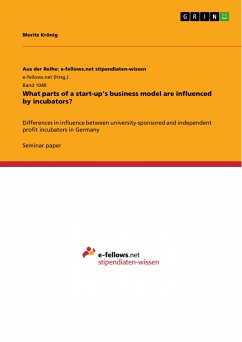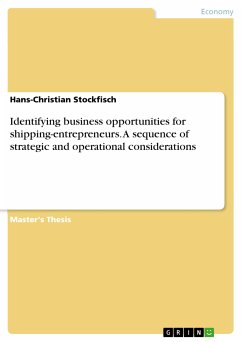Seminar paper from the year 2014 in the subject Business economics - General, grade: 1,7, Technical University of Munich (TUM School of Management), language: English, abstract: Incubators and their influence on start-ups as well as their performance are widely discussed, especially in Germany where Berlin and Munich are developing a very supportive environment for start-ups. There is a variety of different types of incubators and offered services. Some work for-profit others work non-profit and receive governmental support. For a start-up, the decision, which incubator to chose (or apply for a development program) depends on its business model and the parts of it that need further adjustment. Does a start-up for example need capital? Does it require a lab to conduct experiments? Does it need entrepreneurial education? All those questions influence the decision for the right incubator type. There has been some research done compiling the services offered by incubators in general (Aerts, Matthyssens, & Vandenbempt, 2007; Al-Mubaraki & Busler, 2010; European Commission Enterprise Directorate-General, 2002; Rice, 2002; Sang Suk & Osteryoung, 2004). In a first step I want to map the different services offered by incubators to the parts of a start-up’s business model to generate an overview of what parts of a business model are influenced in general. There has also been some research about the services offered by different types of incubators (Mian, 1994, 1996) and there has been research comparing different types of incubators (Gassmann & Becker, 2006; Grimaldi & Grandi, 2005; von Zedtwitz & Grimaldi, 2006), but there is almost no literature comparing the influence on a start-up’s business model of different types of incubators. In this work I want to reveal differences in influence on a start-up’s business model in Germany between university-sponsored incubators and independent incubators, as they are the most distinguishable types of incubators. University-sponsored incubators mostly belong to governmental institution and are non-profit oriented, whereas independent (private) incubators do not belong to any institution and aim to make a profit. This work should help distinguish university-sponsored and independent incubators regarding their influence on a business model. First I want to compile the results of existing literature and in a second step challenge those results with qualitative interviews. Therefore I conducted interviews with one university-sponsored and one independent incubator. Providing a clear view on the differences in influence can help start-ups decide which incubator type to chose.
Bitte wählen Sie Ihr Anliegen aus.
Rechnungen
Retourenschein anfordern
Bestellstatus
Storno









